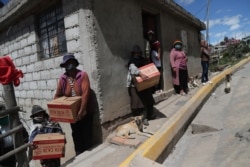About 265 million people around the world are expected to face acute food insecurity this year because of the coronavirus pandemic, according to a World Food Program Analysis.
The figure is more than double the number the 130 million who were estimated to suffer food shortages last year.
The April analysis came just before this week’s World Hunger Day, an initiative of the New York-based Hunger Project
The pandemic is expected to exacerbate an already dire situation – 1 out of 9 people now do not have enough to eat, meaning that 820 million people face sustained hunger.
"We know this is beyond health – it's becoming a hunger crisis and is taking an enormous toll on individuals," said Hunger Project spokesperson Sara Wilson.
The "hunger pandemic" linked to the COVID-19 outbreak is expected to be caused by economic hardship, price hikes, and substantial breaks in the food supply chain.
"There are no famines yet,” WFP Executive Director David Beasley told the U.N. Security Council. However, he said, “we could be facing multiple famines of biblical proportions within a short few months."
The coronavirus is disrupting food supply chains because farmers and laborers cannot work or travel, transportation delays are causing shortages, and in the United States, for example, meat processing plants have been forced to close.
Not only are these breaks in the supply chain affecting the availability of food, but also its affordability. Millions who already struggled to support themselves and their families have been struck by economic hardship caused by lockdowns around the globe.
With seasonal work disrupted, overseas remittances are expected to drop sharply in many countries, including Haiti, Nepal, and Somalia, said Beasley. With travel restrictions across the globe, lack of revenue from vacationers will damage countries such as Ethiopia, where tourism receipts account for 9.4 percent of gross domestic product. In countries like South Sudan, where oil accounts for 98.8 percent of total exports, collapsing oil prices will decimate the economy. As the economic crisis deepens, donations from richer nations are expected to drop, meaning fewer resources will go toward lifesaving aid, said Beasley.
Moreover, as global unemployment peaks, food prices in many countries continue to rise.
In the United States, the price of processed meat spiked 11.6 percent higher than reported from the same period last year, according to Nielsen, a global marketing research firm.
In some developing nations, the effects are even more dramatic. In Kenya, for example, the price of corn, a staple food, has risen more than 60 percent this year, according to a report by the Famine Early Warning Systems Network, a provider of information on food insecurity set up in 1985 by the U.S. Agency for International Development.
The outbreak has disproportionately hit the world’s poorest communities, those that already risk food insecurity, limited information and access to healthcare, and poor sanitation. The effects of COVID-19 on food insecurity and hunger are the highest in such Middle Eastern and African countries as Syria and Yemen, where conflict adds to the pandemic's damaging effects in areas already at risk, WFP officials say.
"In a worst-case scenario, we could be looking at famine in about three dozen countries, and in fact, in 10 of these countries, we already have more than 1 million people per country who are on the verge of starvation. In many places, this human suffering is the heavy price of conflict," said Beasley.
For some countries, the coronavirus adds to existing food challenges.
In Pakistan, for example, a heat wave, locusts, and flooding have been forecast for the coming weeks and are expected to interfere with crops, said Jennifer Ankrom, the country director in Pakistan for Action Against Hunger.
"All of these overlapping crises are coming at a time when the ability of the global community to support relief efforts is depleted," she said, "I think we will start to see reduced ability of the local civil society [in Pakistan] in the coming months especially if the number of cases continues to rise."
Pakistan is not alone in its number of challenges during this time. Many other countries are juggling crises on top of the pandemic, including southeastern African nations, such as Zimbabwe, that have been struck by a severe drought.
As new crises emerge, officials at the WFP and other organizations advise that governments must address the COVID-19 "new normal" and how to carry on and face the new challenges while managing a global pandemic. The effects of COVID-19 are expected to last for a long time, and national leaders must be able to identify needs and gaps in their infrastructure and prioritize preparedness for future changes, Hunger Project officials said.
There have been some promising developments regarding food insecurity in the months since the outbreak began, such as a project supported by Heifer International in which Ecuadoran farmers deliver food to locked-down Quito families, but experts say inaction could be devastating to millions of people in the immediate future.










